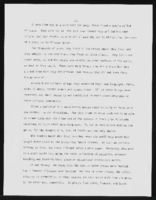Search the Special Collections and Archives Portal
Search Results

Transcript of interview with Georgia Adras by Robin L. Hayes, March 02, 1977
Date
Archival Collection
Description
Text

Transcript of interview with Charlotte Brascia by Joe Mascellino, February 24, 1977
Date
Archival Collection
Description
Text

Transcript of interview with Beula Jane Adams by Maureen Beth Conner, May 11, 1977
Date
Archival Collection
Description
Text
Jocelyn L. Oats oral history interview
Identifier
Abstract
Oral history interview with Jocelyn L. Oats conducted by Rebecca Snetselaar on April 29, 2016 for the Folklife Program of the Nevada Arts Council and the Oral History Research Center at UNLV Libraries. Oats begins the interview by talking about her childhood and family. She explains what she was allowed to have in terms of media and music, what gospel music means to her, and which members of her family are singers. Oats talks about religion, traditions in church, and what it means to sing in church. Lastly, Oats tells stories of her life and where to find gospel music in Las Vegas, Nevada.
Archival Collection
Loretta Whitney oral history interview
Identifier
Abstract
Oral history interview with Loretta Whitney conducted by Rebecca Snetselaar and Binnie Wilkin on April 15, 2016 for the Folklife Program of the Nevada Arts Council and the Oral History Research Center at UNLV Libraries. Whitney begins talking about her family life, childhood, and family histories. She mentions storytelling in education and what education used to be, and explains why she moved to Las Vegas, Nevada. Whitney begins to speak about religion and the church. She explains her family culture and traditions. Lastly, she defines what loving and caring for others means and how she has evolved personally throughout her life.
Archival Collection
Maude Woo oral history interviews
Identifier
Abstract
Oral history interviews with Maude Woo conducted by Barbara Tabach on February 11, 2007 and February 25, 2007 for Reflections: the Las Vegas Asian American and Pacific Islander Oral History Project. In these interviews, Woo discusses her early childhood in Korea, taking care of her siblings, and difficult memories of war. Later, she discusses travelling to the United States and having foster parents, and going to college for nursing. She married her first husband and they had two sons, David and John. The family moved to Orange County, California where Maude raised the family and eventually started a private practice. Later, Woo divorced her first husband. She married her current husband, Leland, in 2011. She discusses her family, the importance religion has in her life, and coming to Las Vegas, Nevada to retire. Digital audio and photographs available; digital transcript draft available.
Archival Collection
Foster Brooks recordings, 1975 to 1993
Level of Description
Scope and Contents
Brooks discusses his career as a comedian, his show at the Desert Inn, health issues,his family, and religion. He also answered caller questions People called in and asked him questions such as asking about his favorite comedians and political stances. In this extended interview, that may run across multiple days, Brooks discusses a wide range of topics from comedy, music, and performing to religion, politics, getting older, and law-and-order. He also answers questions from callers. Also includes recorded stage performances.
Archival Collection
Pagination
- Previous page ‹‹
- Page 2
Archival Component

Transcript of interview with William Brymer by Rob Mullaney, March 9, 1979
Date
Description
Text

Untitled unpublished manuscript by Roosevelt Fitzgerald
Date
Archival Collection
Description
From the Roosevelt Fitzgerald Professional Papers (MS-01082) -- Unpublished manuscripts file. "Injustice Blacks Have Suffered…" ending with Naomi Long Madgett's poem "Midway."
Text

Transcript of interview with John Brooks by Jeff Kennedy, February 28, 1979
Date
Archival Collection
Description
Text
